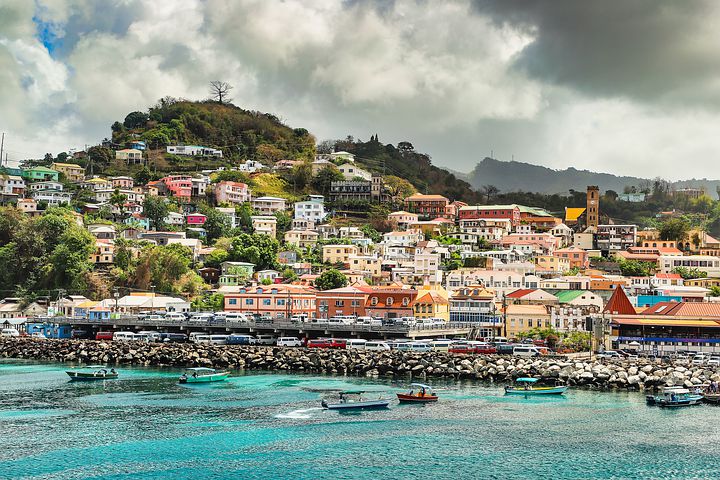As one of the island nations in the Caribbean Sea, Grenada is known for its inherent beauty and easy way of life. With a tropical climate and laid-back lifestyle, Grenada and its inhabitants enjoy their existence, industrially contributing the nation’s exportable riches, earning it the nickname the “Spice Isle.”
History
Grenada is known most for its recent political history. Invaded in 1983 by a joint Caribbean-US military task force, the raid was ordered after human rights violations following a military coup assisted by Cuba. The event was the culmination of an unstable political period that lasted for four years after the initial democratic government had been overthrown immediately after gaining independence.
As a result of the invasion, democracy was restored to Grenada in the 1984 elections, and the nation continues to grow on the world stage, both as a political entity and a popular tourist destination. Prior to independence, Grenada had been a British colony since 1763. It was their colonialists who introduced nutmeg to the isles, still Grenada’s major export.
The British captured Grenada from the French who had colonized the islands in the 1700’s. To this day the country has names in French, and you can hear French-sounding words in the local dialect, although the country remained in British hands for 101 years.
Christopher Columbus first sighted Grenada in 1498, at which time it was inhabited by the native Caribs. Initially called Concepcion, the country was most likely renamed Grenada (as a misnomer for the Spanish word “Granada”) by French invaders who warded off the natives. A plantation colony based on slave labor thrived in 1649 and was not abolished until 1834, by which time Grenada had been fully developed as a lucrative spice island.
With a burgeoning population and the end of an era of empire, Grenada fully gained independence in 1974, although the transition was met with some resistance until the 1984 election. The Grenada National Museum (Corner of Young and Monckton Streets, St George’s) offers insight into the country’s rich heritage. Housed in an old fort built by the French in 1704, it displays many cultural artifacts telling the story of Grenada, from its first inhabitants to the present day.
Culture
Holding such an intriguing mix of history, Grenada has a rich culture like no other nation in the Caribbean. Take in a show at Spice Basket (Beaulieu, St George’s), which has regular events that showcase Grenada’s art, music and theatre. You can also visit the in-house museum which displays exhibits reflecting Grenada’s modern society, such as its dedicated cricket center (the national sport).
Staples of Grenada’s culture are soca and calypso music, and all the locals love to let loose and get their dancing shoes on. The local music is celebrated in many of the annual carnivals and on the jam-packed festival calendar.
It’s no doubt that most visitors are drawn to Grenada because of its amazing nature, yet there are many cultural events that make it an intriguing and fun-filled destination any time of year. The islanders love the pulse and beat of soca and calypso, and in true Caribbean spirit, they love to dance, carnival style. The Grenada Carnival, also known as Spice Mas, runs annually every August and reflects the sheer energy of the Grenadians, whereas the world famous Sailing Festival reflects their prime position in the sea.
Port Louis Grenada Sailing Festival
Since its commencement in 1996, this annual sailing festival has grown to attract boat enthusiasts from all over the world. Taking place at the end of January, it features four days of yacht racing, regattas, and ends with a street festival.
Independence Day
This Grenada holiday held in February is celebrated all over the islands to mark Grenada’s independence from colonial rule. The official highlight is a military parade at Tanteen; however, the real fun starts as you dance into the night with the locals at one of the many beach parties.
Carriacou Carnival
A sister of the larger festival held on Grenada Island each year, this carnival held at the beginning of March is another excuse for the locals to get down and party. Unique to this event is the Shakespeare Mas, which is an intriguing contest of quotations.
Spice Mas (Grenada Carnival)
The main cultural event of Grenada, Spice Mas is held every year in August. A colorful and cheerful carnival, you will hear the tones of calypso played while you watch the pageants go by. Don’t be afraid to join in the fun – the locals wouldn’t have it any other way!
Carriacou Panrang Festival
Held every year on the weekend preceding December 25, this festival celebrates music, arts and culture on Grenada’s second largest island and attracts big crowds.
A tourist visa is not needed for US citizens for stays up to 90 days in Grenada. It is recommended that your passport is valid for at least six months from your date of travel. Be sure to have at least two blank pages in your passport for immigration stamps. The same rules and recommended apply to citizens of Canada, the United Kingdom, Australia, and New Zealand.
Health and Safety
Grenada is a fairly disease free island; however, it is a tropical country, and is therefore advised to get the following vaccines four to six weeks before arrival: hepatitis A and B, typhoid, rabies, MMR, and tetanus-diphtheria. Grenada is devoid of yellow fever, and citizens from the US are not required to provide any proof of vaccines. Cases of dengue fever have not been reported for a number of years.
Grenada is generally a safe place, and the residents have always welcomed tourists with open arms and warm hospitality. Like anywhere else, keep an eye on your valuables, particularly when walking late at night or in isolated areas. Many parts of Grenada have no sidewalks and are poorly lit, so be careful of traffic and potential muggers. It is best to call a taxi from your restaurant or hotel instead of hailing one on the streets, although during the daytime the risk is substantially lower.
Hail! Grenada, land of ours,
We pledge ourselves to thee,
Heads, hearts and hands in unity
To reach our destiny.
Ever conscious of God,
Being proud of our heritage,
May we with faith and courage
Aspire, build, advance
As one people, one family.
God bless our nation.






